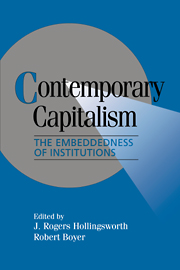Book contents
- Frontmatter
- Contents
- Acknowledgments
- List of Contributors
- Chapter 1 Coordination of Economic Actors and Social Systems of Production
- PART I THE VARIETY OF INSTITUTIONAL ARRANGEMENTS AND THEIR COMPLEMENTARITY IN MODERN ECONOMIES
- PART II HOW AND WHY DO SOCIAL SYSTEMS OF PRODUCTION CHANGE?
- Chapter 6 Beneficial Constraints: On the Economic Limits of Rational Voluntarism
- Chapter 7 Flexible Specialization: Theory and Evidence in the Analysis of Industrial Change
- Chapter 8 Globalization, Variety, and Mass Production: The Metamorphosis of Mass Production in the New Competitive Age
- Chapter 9 Continuities and Changes in Social Systems of Production: The Cases of Japan, Germany, and the United States
- PART III LEVELS OF SPATIAL COORDINATION AND THE EMBEDDEDNESS OF INSTITUTIONS
- PART IV CONCLUSION
- Index
Chapter 7 - Flexible Specialization: Theory and Evidence in the Analysis of Industrial Change
Published online by Cambridge University Press: 05 June 2012
- Frontmatter
- Contents
- Acknowledgments
- List of Contributors
- Chapter 1 Coordination of Economic Actors and Social Systems of Production
- PART I THE VARIETY OF INSTITUTIONAL ARRANGEMENTS AND THEIR COMPLEMENTARITY IN MODERN ECONOMIES
- PART II HOW AND WHY DO SOCIAL SYSTEMS OF PRODUCTION CHANGE?
- Chapter 6 Beneficial Constraints: On the Economic Limits of Rational Voluntarism
- Chapter 7 Flexible Specialization: Theory and Evidence in the Analysis of Industrial Change
- Chapter 8 Globalization, Variety, and Mass Production: The Metamorphosis of Mass Production in the New Competitive Age
- Chapter 9 Continuities and Changes in Social Systems of Production: The Cases of Japan, Germany, and the United States
- PART III LEVELS OF SPATIAL COORDINATION AND THE EMBEDDEDNESS OF INSTITUTIONS
- PART IV CONCLUSION
- Index
Summary
There is widespread agreement that something dramatic has been happening to the international economy over the past two decades: rapid and radical changes in production technology and industrial organization, a major restructuring of work markets, and consequent large scale changes in the policies of economic management at the international, national, and regional levels. At the same time there is a great deal of confusion about how to characterize these changes, the mechanisms at work, and the policy implications for different groups of economic and political actors. One way of accomplishing these tasks is to postulate a change of basic manufacturing organization from a “Fordist” pattern that prevailed in the years of the long post-1945 boom to a “post-Fordist” successor in the later 1970s and 1980s. Many people habitually conflate a variety of approaches to industrial change under this heading, such as flexible specialization, regulation theory, disorganized capitalism, or diversified quality production. The resulting problem is that significant differences of approach are concealed by a superficial similarity between the proponents of flexible specialization and a set of apparently similar but underlyingly divergent ideas. The purpose of this paper is thus to set out the distinctive properties of flexible specialization as a theoretical approach to the analysis of industrial change and examine its relationship to problems of empirical evidence.
FLEXIBLE SPECIALIZATION: TECHNOLOGICAL PARADIGMS AND POSSIBLE WORLDS
Despite their apparent similarities, flexible specialization and post-Fordism represent sharply different theoretical approaches to the analysis of industrial change.
- Type
- Chapter
- Information
- Contemporary CapitalismThe Embeddedness of Institutions, pp. 220 - 239Publisher: Cambridge University PressPrint publication year: 1997
- 35
- Cited by



